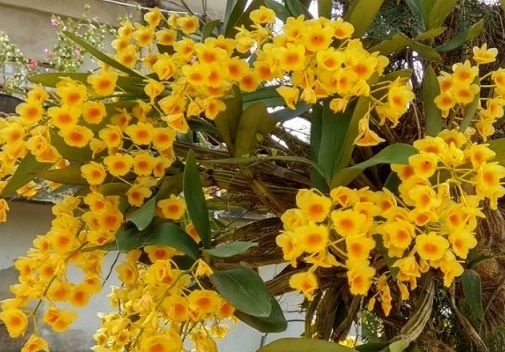Phytochemical from Orchids Found to Stop Abnormal Eye Blood Vessel Growth in Premature Oxygen-Induced Retinopathy
Nikhil Prasad Fact checked by:Thailand Medical News Team Apr 09, 2025 3 days, 15 hours, 43 minutes ago
Medical News: Ancient Orchid Extract Shows Modern Promise for Preventing Vision Loss
A team of Chinese researchers has discovered a powerful new way to prevent abnormal blood vessel growth in the eyes - a leading cause of blindness in newborns and older adults. By using a compound derived from the Dendrobium chrysogenum orchid, an herb celebrated for centuries in traditional Chinese medicine, scientists were able to halt the dangerous overgrowth of retinal blood vessels in rats suffering from oxygen-induced retinopathy (OIR), a condition that mimics retinopathy of prematurity (ROP) in human infants.
 Phytochemical from Orchids Found to Stop Abnormal Eye Blood Vessel Growth in Premature
Phytochemical from Orchids Found to Stop Abnormal Eye Blood Vessel Growth in Premature
Oxygen-Induced Retinopathy
This
Medical News report explores how the compound, named JCS1S2, dramatically reduced the formation of abnormal blood vessels in animal models, offering new hope for safer, longer-lasting treatments for serious eye diseases like ROP, diabetic retinopathy, and age-related macular degeneration (AMD).
Research Team and Institutional Background
The groundbreaking study was conducted by scientists from the Department of Ophthalmology at the Affiliated Hospital of Zunyi Medical University in Guizhou, China, in collaboration with the Zhongshan Institute for Drug Discovery and the Glycochemistry and Glycobiology Lab at the Shanghai Institute of Materia Medica, Chinese Academy of Sciences.
What Is Retinal Neovascularization and Why It Matters
Retinal neovascularization is the unchecked growth of fragile, abnormal blood vessels in the retina. It is commonly triggered by low oxygen levels, especially in premature infants who are suddenly exposed to higher oxygen levels after birth. The condition can lead to bleeding, retinal detachment, and eventual blindness if left untreated.
In modern medicine, the go-to treatment for retinal neovascularization is anti-VEGF therapy - injectable drugs that block vascular endothelial growth factor (VEGF), a protein responsible for stimulating abnormal blood vessel growth.
However, these injections are invasive, short-lived, and carry risks of complications like infection or retinal damage. There's a growing demand for more natural, safer, and longer-acting alternatives.
The Promise of JCS1S2
JCS1S2 is a sulfated polysaccharide extracted and chemically modified from the stem of Dendrobium nobile, a plant long used in traditional Chinese herbal medicine. The compound was tested in oxygen-induced retinopathy (OIR) rat models and in cultured retinal cells to simulate the oxygen swings that affect premature infants' eyes.
Rats were split into three main groups: a healthy control group, an untreated OIR group, and an OIR group treated with different concentrations of JCS1S2. The treatment was administered directly into the eye via intravitreal injection.
Key Findings from the Study
>
-Dose-Dependent Inhibition: Retinal imaging showed that JCS1S2 dramatically reduced the formation of twisted, leaky new vessels. The higher the dose, the better the results.
-VEGF Suppression: Both genetic (PCR) and protein-level (Western blot) tests confirmed that JCS1S2 suppressed multiple members of the VEGF family - including VEGF-A, VEGF-B, VEGF-D - as well as their receptors (VEGF-R1 and VEGF-R2).
-Inflammation Control: The compound also inhibited the Toll-like receptor 4 (TLR4) and NF-κB pathway - both known to spark inflammation and worsen retinal damage.
-Transcriptome Evidence: Through full gene expression sequencing, scientists identified hundreds of genes impacted by JCS1S2, many related to inflammation, vascular development, and cell metabolism. Notably, genes that promote blood vessel growth were dialed down, while protective and metabolic genes were upregulated.
-Glial Cell Protection: Retinal Müller cells, crucial for maintaining retinal structure and function, were shown to be less reactive and inflamed in JCS1S2-treated eyes, reducing their contribution to pathological angiogenesis.
How the Treatment Works
The data point to one key pathway: TLR4/p-NF-κB/VEGF. Under stress conditions such as hypoxia (low oxygen), retinal cells turn on TLR4, which triggers NF-κB, a major switch that activates inflammation and VEGF production. JCS1S2 blocks this chain reaction, dampening inflammation and starving abnormal vessels of the signals they need to grow.
Advantages Over Current Therapies
JCS1S2 holds several advantages over conventional treatments:
-Longer-lasting effects: Unlike anti-VEGF drugs that require frequent injections, JCS1S2’s binding properties may allow it to linger longer in the eye.
-Broad-spectrum inhibition: It targets not just VEGF-A, but also VEGF-B, VEGF-D, and both VEGF-R1 and VEGF-R2.
-Natural origin: As a plant-derived compound, it may offer a safer side-effect profile.
-Multi-pathway action: Beyond VEGF inhibition, it also reduces inflammation and protects the retina’s structural support cells.
A Potential Game-Changer for Pediatric and Adult Eye Disease
The implications of this study are vast. Retinopathy of prematurity affects thousands of premature babies worldwide, and current treatments can be risky and hard to access in low-resource settings. A natural, long-lasting injection like JCS1S2 could not only improve outcomes but also reduce the burden of care.
In adults, retinal disorders like diabetic retinopathy and AMD affect millions. A therapy that addresses both inflammation and abnormal blood vessel growth could revolutionize treatment protocols and reduce the need for frequent eye injections.
Final Conclusion
The findings from this research highlight the enormous therapeutic potential of JCS1S2 as a new class of treatment for retinal neovascularization. By simultaneously suppressing multiple VEGF pathways and inflammatory signals like TLR4 and NF-κB, JCS1S2 effectively halts the progression of damaging blood vessel growth in the retina. Unlike current anti-VEGF drugs that are limited to targeting one or two pathways and require repeated injections, JCS1S2 offers a broader mechanism of action and potentially longer-lasting effects with fewer side effects. These promising results position JCS1S2 as a strong candidate for future clinical trials and possible integration into the treatment arsenal for both infant and adult retinal diseases. As further studies unfold, this compound could usher in a new era of herbal-derived precision therapy for vision preservation.
The study findings were published in the peer reviewed journal: Frontiers in Pharmacology
https://www.frontiersin.org/journals/pharmacology/articles/10.3389/fphar.2025.1499420/full
For the latest on Herbs and Phytochemicals, keep on logging to Thailand
Medical News.
Read Also:
https://www.thailandmedical.news/news/latest-study-review-finds-that-ginkgo-biloba-is-not-effective-in-treating-glaucoma
https://www.thailandmedical.news/news/naringin-protects-retinal-cells-from-damage-and-prevents-vision-loss-in-branch-retinal-vein-occlusion
https://www.thailandmedical.news/news/the-phytochemical-genipin-from-gardenia-plants-can-help-regenerate-damaged-or-diseased-human-nerves
https://www.thailandmedical.news/articles/herbs-and-phytochemicals
https://www.thailandmedical.news/pages/thailand_doctors_listings
